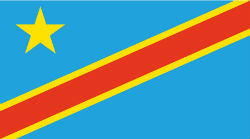The legal system is based on Belgian law, customary and tribal law.
Country overview
Population
83.3m
President
Joseph Kabila
Capital city
Kinshasa (11.6m people)
Other major cities
Mbuji-Mayi (2.0m people), Lubumbashi (2.0m people), Kananga (1.0m people)
Major industries
Mining, mineral processing, consumer products, metal products, processed foods and beverages, timber, cement, commercial ship repair.
Currency
Congolese franc
Languages
French (Official language), Lingala, Kikongo, Swahili, Tshiluba
Major religions
Christianity (Majority religion) and Islam
- Capital Markets
Corporate Governance Code
N/A
Current No of listed companies
N/A
Exchange
N/A
Listing Rules
N/A
Principal legislation
N/A
Public offers / disclosure regulations
N/A
Regulatory body or bodies
N/A
Takeover / merger regulations
N/A
- Competition Regulation
Legislation
The relevant legislation applicable in DRC are:
- Ordinance-law 41-63 of 24 February 1950 on the unfair competition; and
- Departmental order of 26 May 1987 on creation and functioning of the Competition Commission
Scope
The provisions of the texts cover the following points:
- The cases of unfair competitions and their repressions
- The composition, mission, power, submission of the Competition Commission
- Corruption / transparency
Corruption Perception Index rank worldwide for 2017
161
Signatories to United Nations Convention Against Corruption (UNAC)?
No
(UNAC) Ratified?
Yes
Corruption Perception Index score for 2017
21
Signatories to the OECD Convention on Combating Bribery of Foreign Public Officials in International Business Transactions?
No
Signatories to the African Union Convention on Preventing and Combating Corruption?
Yes
Ratified?
No
- Disputes
Arbitration
As a state member of OHADA, The Democratic Republic of Congo is subject to the OHADA Arbitration Law dated 11 March 1999 which governs the arbitration law of all members of OHADA. It is intended to apply to any internal or international arbitration, whether ad hoc or institutional.
The Uniform Act on Arbitration (Uniform Act) does not limit arbitration to commercial and professional matters - individuals and corporate bodies alike may refer their dispute to arbitration.
Structure of the court system
- The Peace tribunal;
- The First Instance Courts;
- The Courts of appeal; and
- The Supreme Court
Judiciary
There are two kinds of magistrates in DRC:
- The Magistrates of the seat; and
- The Magistrates of public ministry
Enforcement of Foreign Judgments
The courts of the DRC recognise and enforce a foreign judgment if it (1) is not contrary to the public order; (2) it is final and dispositive of the claim under the law of the country in which judgment was rendered; (3) the copy of the original judgment meets all legal conditions for authenticity; and (4) the jurisdiction of the court rendering the judgment is not premised solely on the nationality of the defendant.
Enforcement of arbitral awards
Law No 13/020 of 26 June 2013 authorises the accession of DRC to the Convention on the Recognition and Enforcement of Foreign Arbitral Awards signed in New York on 10 June 1958. This Convention obliges the courts to enforce foreign arbitral awards without reviewing them.
- Foreign Investment
Regulated by Law No. 004/2002 on investment code
The investment Code attracts foreign investments into the country. The National Agency for Investment Promotion (ANAPI) is responsible for facilitating investment. In DRC, there is a one-stop shop to simplify business creation. There is no limits on foreign control for investment in DRC.
- Regulation
Tobacco
Order No 1250/CAB/MIN/SP/010/AQ/2007 of 19 July 2007 amended and completed by Order No 1250/CAB/MIN/SP/020/JT/2007 of 28 December 2007 on applicable measures to the use and consumption of tobacco, tobacco products and its derivatives.
Press
Law No 96-002 of 22 June 1996 on the exercise of the freedom of the press.
Telecommunications
Law No 013/2002 of 16 October 2002 on telecommunications in DRC.
- Taxation
Exchange control
The Central Bank is responsible for regulating exchange control.
Payroll Tax and Social Security
The payroll tax is calculated according to a progressive tax scale. The overall tax shall not exceed 30% of the taxable income. Employers of expatriate employyes are subject to a tax of 25% on the expatriates's remuneraion. Social contributions are 3.5% for the employee's share and 9% for the employer’s share.
Interest
The standard rate of interest is 20%.
Stamp Duty
N/A
Value Added Tax
The standard rate is 16%. The rate is 0% on exports and assimilated transactions.
Losses
There is a minimum tax which applies to loss making companies: 2.5 million Congolese francs (Large companies), 750,000 Congolese francs for medium-sized companies and 30,000 Congolese francs for small-sized companies.
Royalties
The standard rate of royalties is 20%. The net amount of royalties is calculated by deducting 30% from the royalties invoiced.
Dividends
The standard rate of dividends is 20%.
Real Property Tax
The tax rates vary according to the nature of the goods and locality ranks.
Personal Income Tax
The personal income tax is calculated according to an annual progressive tax. It cannot exceed 30% of the taxable salary. Indemnities and allowances paid to an employee relating to the termination of its empoyment contract are taxed to a Personal Income Tax at the rate of 10%. Foreign – sourced profits are not taxable.
Corporation Tax
The Corporate Income Tax rate is 35% (30% for mining companies).
